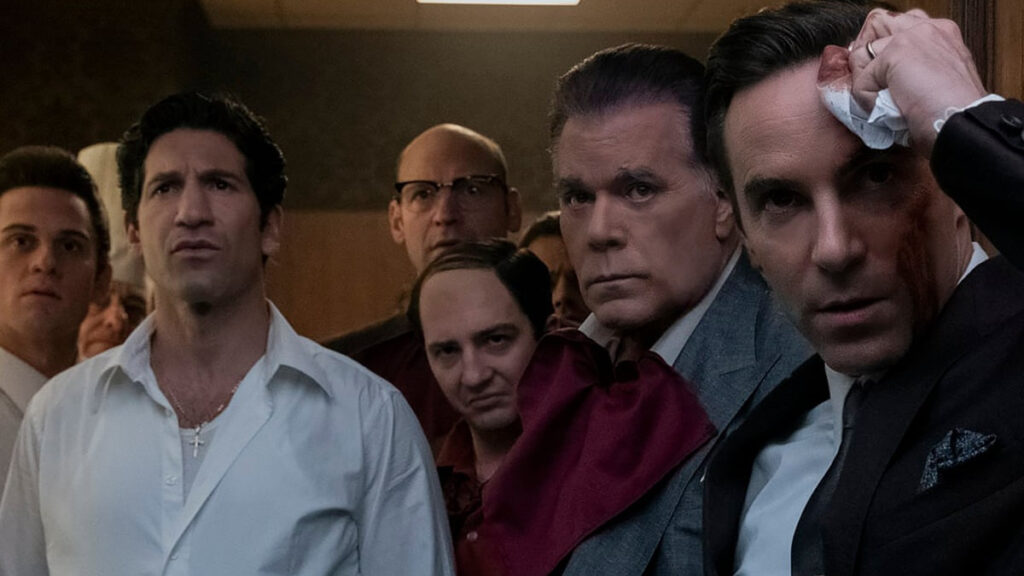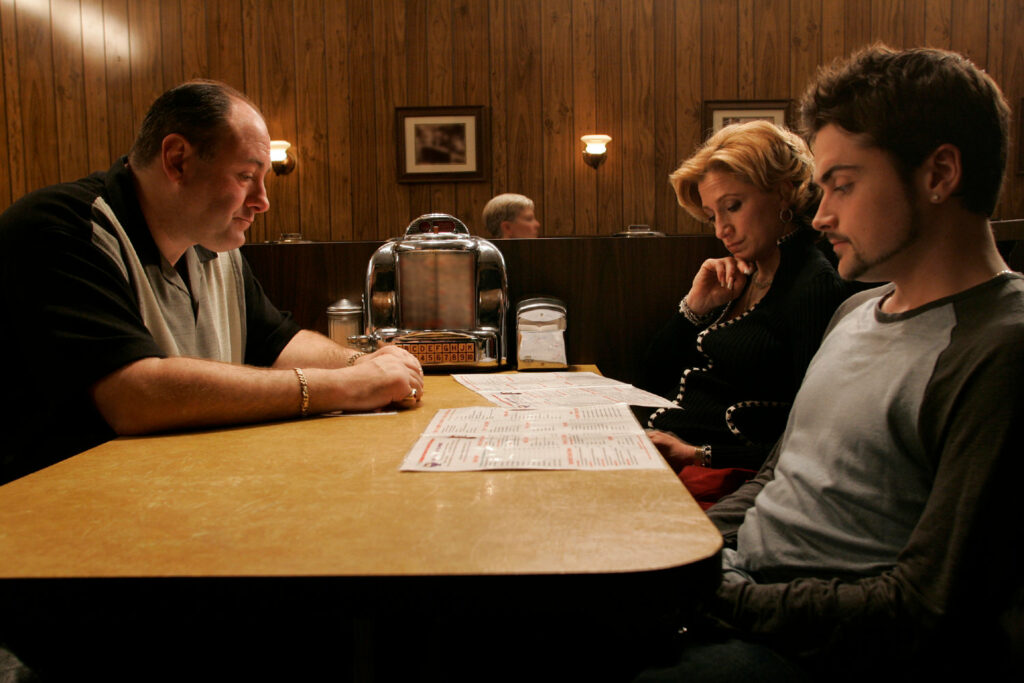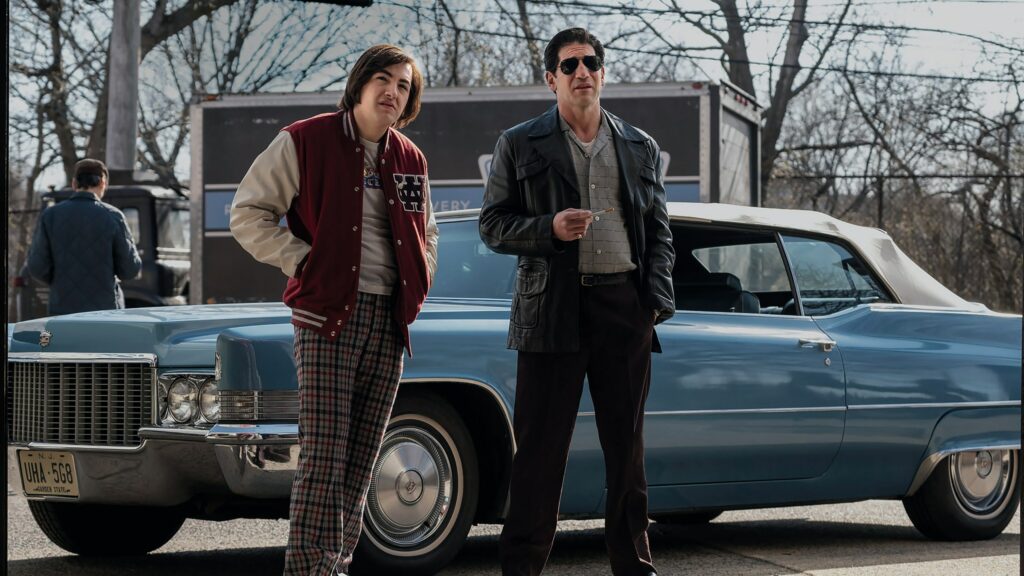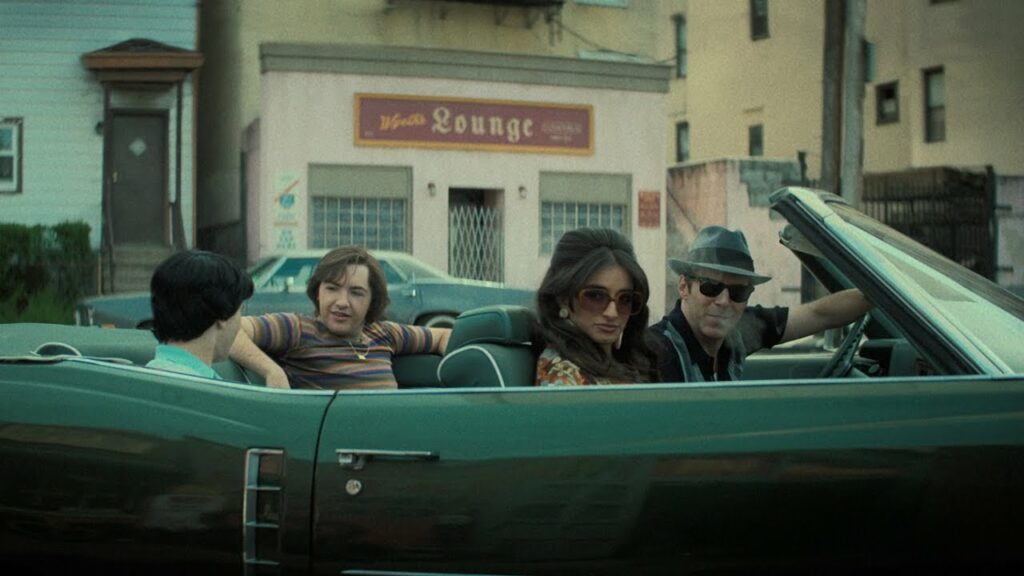This article contains minor spoilers for The Sopranos, and no spoilers for The Many Saints of Newark.
“It’s good to be in something from the ground floor,” Tony Soprano (James Gandolfini) tells his therapist Dr Melfi (Lorraine Bracco) during The Sopranos pilot. “I came too late for that, I know. But lately I’m getting the feeling, I came in at the end. The best is over.”
It’s ironic that this immensely popular show, which is credited as kickstarting the “Golden Age of TV”, opens on such defeatism. But it’s also entirely appropriate for The Sopranos. The highly-anticipated prequel film The Many Saints of Newark will focus upon Tony Soprano’s childhood (played by the late Gandolfini’s son, Michael) while showing the previous generations of gangsters – like his father Johnny Boy Soprano (Jon Bernthal) or Dickie Moltisanti (Ray Liotta) – only briefly seen in flashbacks. But The Sopranos itself is not about scrappy up-and-comers, but an established, tired institution that its members couldn’t pull themselves away from if they tried. When the show starts, Tony has already achieved the “American Dream” of a huge house, full family and material comforts. Now he has to live with it.

Often The Sopranos gets relegated to shorthand for any interchangeable gangster media – i.e. “I want to hire the Sopranos to beat the shit out of him with a hammer” in The Social Network – but The Sopranos is a highly self-aware text which frequently references and deconstructs the mafia movies before them. It’s a running joke how the Sopranos crew repeatedly watches The Godfather, so much the guys will only say “one” or “two” to reference them. When the wives start a film club of the AFI Top 100 films, they all collectively groan when they reach Francis Ford Coppola’s classic.
Sopranos characters love The Godfather for its classy and honourable depiction of gangster life; they do not comment on the indictment of choosing “family business” over a fresh start. Mafia members rarely have much self-awareness, so Tony’s protégé Christopher Moltisanti (Michael Imperioli) can claim he “loves movies” and countlessly rewatch Goodfellas without even knowing what a “character arc” is. The group latch onto the glamorous and reverential depiction of their lifestyle, which to them encapsulate an honour code and dignity, which in reality may have never existed.
The Sopranos itself would often satirise how it aided such stereotypes with Dr Melfi’s ex-husband (Richard Romanus) complaining about Italian-American discrimination. Being labelled one of the “All-Time Great TV Shows” could make The Sopranos seem dense, but its recently enjoyed a resurgent recognition for just how funny the show was. Through the idiosyncratic mannerisms of its mobsters – especially the oft-befuddled soldier Paulie Gaultieri (Tony Sirico) – and their collective love for food, The Sopranos gently buffs away the shine and polish from gangsters’ image as slick, calculating businessmen. Instead, the show reveals them as tempestuous bozos who almost initiate gang wars through off-colour jokes or, in one of the series’ best episodes “Pine Barrens,” get lost in the woods when dumping a body.

A more prominent subversion of classic genre tropes and gangster stereotypes is the main premise: Tony Soprano attending therapy after suffering from panic attacks. Mental health was even less appreciated back in 1999, let alone with macho gangsters, meaning Tony went to great length to keep his sessions hidden and would participate in the dismissal of “mental midgetry” whenever his underlings brought it up. This tied in with Tony’s own admiration for men like “Gary Cooper, the strong silent type,” another movie-star persona which Tony links to a past America that seemed more certain of itself.
The Sopranos featured an uncanny insight into its characters inner-psyche, with several episodes revolving around Tony’s dreams. It also peered into Tony’s childhood, and how his upbringing informed his current position and mental state, as The Many Saints of Newark will likely expand on. An essential character is Tony’s mother Livia (Nancy Marchand), who constantly complains and pesters her children. Dr Melfi unpacks the control the old woman exerts over Tony’s life, especially through Tony’s Freudian relationships with multiple mistresses (or “goomars”). Tony also recalls one time Livia told his father she’d rather smother her children with a pillow than move them away to Reno. Thanks to this, Tony blames his mother for preventing his chance at another life. Tony rarely seems to regret his line of work, but he will often think about how his own children are “doomed” if they follow in his footsteps, while also being unable to consider any other path for them.

Yet, despite his therapy, Tony often has a closed-minded view of the past. He always accepted his father “Johnny Boy” was the “good parent” worn down by his mother – a fiction that’s bolstered by his position in the male-dominated family business, surrounded by his father’s colleagues – but later episodes reveal the unsurprising flaws in Johnny Boy too. A story about his staying with his mistress while Livia lay bleeding in the hospital over a miscarriage ends with Tony again dismissing his mother, unable to shake off the binaries he’s built up in his mind. Tony also gets angered when Christopher mentions his own father – “the great Dickie Moltisanti, your hero” – was an absentee father and junkie who passed his addiction issues onto his kid.
What our past gives to us, and how (or if) we can overcome its legacy, was a core theme of The Sopranos. Tony later discovers his own father suffered from panic attacks, a hereditary trait in the self-described “putrid rotten Soprano gene” that Tony in turn passes down to his own son. It’s one aspect of Tony’s life that makes him seemingly incapable of fathoming an alternative lifestyle. Several key storylines in The Sopranos demonstrate the difficultly of change. An emblematic one is in “Another Toothpick,” when Tony gets a cop demoted for giving him a speeding ticket. After seeing him at an entry-level job, Tony feels guilty about his actions; yet after considering initial steps towards making it right, he instead says “fuck it” and abandons the case. Tony walks to the edge of moral revelation, but never quite manages to cross the boundary into actual progress.

Anti-climax is a huge part of the Sopranos; from gang-war storylines often fizzling out, to the show’s infamously ambiguous ending. It was a show that still subverts viewer expectations. It remains to be seen if The Many Saints of Newark can recapture that offbeat existential tone, or if setting it within that highly-mythologised past will render it another old gangster flick. But it may further elucidate how Tony Soprano fell into this world of violence and immorality that his adult self seems so discontent over, or whether he had any other choice to begin with.
The Many Saints of Newark releases September 22nd.
